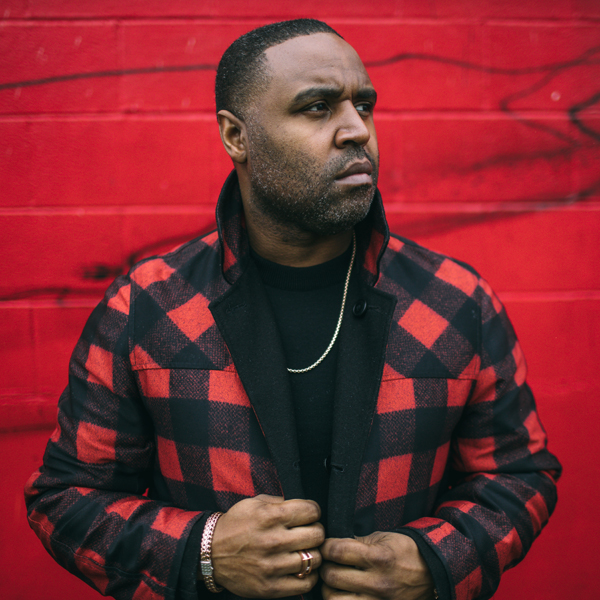March 3, 2023
Drummer and composer Kendrick Scott presents Corridors, his first compositional treatment of trio context — saxophone, bass and drums — and third album for Blue Note Records. The anticipated follow-up to A Wall Becomes A Bridge, Scott’s much-lauded 2019 release with his band Oracle, Corridors unveils an exposed rumination from the Houston-born artist and his acclaimed collaborators: saxophonist Walter Smith III and bassist Reuben Rogers. “I often write about something that I’m going through,” says Scott, “but for this record I wanted to zoom out from my perspective and instead, try to deal with everyone’s. The pandemic forced everyone to deal with the shadows they had been running from.”
Originally commissioned by Rio Sakairi for The Jazz Gallery’s 2020 Artist Fellowship Series, Corridors features eight original compositions and one new arrangement of a beloved tune from the Bobby Hutcherson canon. Born during lockdown, the record focuses on posing outward questions instead of inward contemplation. “I was thinking to myself, ‘How has life changed for everyone?’” says Scott, who began the writing process with a deceptively benign inquiry: What are people doing inside their homes? “From that question, the theme of corridors came to me,” he says, noting that the metaphor was in part inspired by a long corridor in his New York City apartment. “When you think of corridors, it really implies movement, going from one place to the next. But yet now everyone is stagnated inside them.”
Recorded and mixed by James Farber, the album spotlights a different aspect of Scott’s dynamic expression. Where A Wall Becomes A Bridge centers around a provocation, Corridors reflects a shared intimacy. Another conceptual question emerged around loss: “What was taken away from everybody? What did you lose?” For Scott, who serves as album producer, this question became the impetus for assembling the album’s instrumentation. To create a truly empathetic musical gesture, he chose to abandon what he loves most: “In my band Oracle, it’s pretty much built around the guitar and the piano. I thought what I could do in aural form is take away those two instruments.”
From that intrinsically transitory point of origin — and the discomfort of loss — Scott allowed the music to develop, on the page and inside the studio. Over the course of the album, he and his fellow artists transform tension building into a nuanced art form. Summoning waves of harmonic dimension from the drum kit, he shifts between creating atmospheric spaces for Smith and Rogers to explore and plunging into those spaces himself. “One of my strengths is creating a harmonic space for groups,” says Scott, “And the trio afforded me even more space so I too could be freer to interpret all the layers. Reuben navigates the world in such a genuine and loving way and his playing is a reflection of that. He’s the glue element — grounding and uplifting. And Walter has this sound that’s always been so beautiful and inspiring to me. Of my peers, Walter’s always been a guiding light in helping me get my stuff together.”
The ways Smith and Rogers interact with Scott’s long arcs of development become thematic on Corridors. Those interactions are what shape the story. “I learned a lot from Terence Blanchard,” says Scott, who credits the master bandleader and composer with teaching him to think about music cinematically, by posing questions to himself: “How have we progressed the idea we explored two songs ago? How have we progressed the idea we explored two moments ago?”
“What Day Is It?” immediately gets at the heart of collective struggling during lockdown. Taking the listener in different directions, sometimes all at once, the opening track zigs through superimpositions and melodic inversions, transitioning between playful and urgent at a moment’s notice. The album’s title track “Corridors” features a simmering melodic gesture from Rogers that lingers throughout the entire tune. Scott leads the trio through layering waves of tension. Titled for a Rumi poem of the same name, “A Voice Through the Door” offers a window into Smith’s melodic consciousness and creative subtlety; at certain points, he moves from solo improviser to foundational accompanist. He and Rogers flex an artful multiplicity on their respective feature interludes: “One Door Closes” and “Another Opens.” All three artists stretch out on Hutcherson’s “Isn’t This My Sound Around Me?” collectively showcasing their staggering level of receptivity.
Equal parts somber and tender, “One Door Closes, Another Opens” pays tribute to loved ones lost and loved ones born during the pandemic. On this composition as well as on “A Voice Through the Door,” Scott incorporates his own vocal down in the mix. “I love to sing on my record but it’ll never be in the forefront,” he says. “I’m always singing, so it’s just a little window into how I hear music.” Vitality abounds on “Your Destiny Awaits.” Creating closed circuits of pulsing currents, the trio pass along an energy that peaks as Scott’s improvising takes the lead. Extending the urgency of these questions beyond the recording itself, Corridors closes on a frenetic “Threshold,” featuring Scott’s solo up front.
For Scott, Corridors is a reflection of the mingling confusions and clarities that bubbled up on a global scale during the pandemic. “I had to sit and interrogate myself. Maybe my life of travel and music was me running away from the shadows that exist in my corridors here at home. I was never home, and now there’s no gig to play, there’s no place to run off to. The corridor is the Loopback to my inner world and also others as well.”







